Happy Friday! A hearty congratulations to Charles from Englewood, New Jersey, the lucky Dispatch member who filled out our survey earlier this month and won the $500 Visa gift card! Maybe he can save some of it to spend on a subscription to … fried chicken giant Chick-fil-A’s new … streaming service.
Quick Hits: Today’s Top Stories
- Vice President Kamala Harris formally accepted the Democratic Party’s presidential nomination on Thursday, the final night of the 2024 Democratic National Convention. The other speakers included former Arizona Rep. Gabby Giffords, who was shot at a campaign event in 2011, her husband Sen. Mark Kelly of Arizona, Michigan Gov. Gretchen Whitmer, former GOP Rep. Adam Kinzinger of Illinois, Harris’ sister Maya Harris, and North Carolina Gov. Roy Cooper. In her speech, which was steeped in patriotic language, Kamala Harris recounted being raised by a single immigrant mother, laid out the very broad contours of her domestic agenda, and pledged support for Israel. “On behalf of everyone whose story could only be written in the greatest nation on Earth,” she said, “I accept your nomination for president of the United States of America.”
- Canada’s two largest railroad lines temporarily halted operations early Thursday over a labor dispute. The freight companies—Canadian National Railway and Canadian Pacific Kansas City—locked out 9,000 Teamsters union workers after months-long negotiations for a new collective bargaining agreement broke down. The temporary shutdown ran the risk of disrupting supply chains not just in Canada, but also the United States, as nearly one-third of cargo transported by the two companies is moved across the U.S.-Canadian border. But later Thursday, the Canadian government ordered the dispute to be resolved through binding arbitration—a process in which a third-party arbiter hears both sides and decides on an agreement—to ensure Canada’s railways are back at full operation. Canadian National is reportedly ending its lockout immediately, though Canadian Pacific Kansas City has not said when it will end its lockout, nor is it clear when operations will resume.
- The Italian Coast Guard on Wednesday recovered the body of British tech mogul Mike Lynch from the wreckage of the Bayesian superyacht that sunk on Monday. The 56-meter yacht owned by Lynch’s wife, Angela Bachares, had been described by its builders as “unsinkable.” Italian investigators believe the yacht sank quickly on Monday morning after being hit by a waterspout, essentially an oceangoing tornado. Fifteen people who were on the yacht have survived, with six confirmed dead and one unaccounted for. Lynch, considered “Britain’s Bill Gates,” was acquitted in June by a San Francisco jury of fraud charges related to the sale of his company, Autonomy, to Hewlett Packard in 2011. His co-defendant in the trial, Stephen Chamberlain, also died Monday after being struck by a car while jogging in Cambridgeshire on Saturday.
- A federal judge ruled on Tuesday that the U.S. military cannot turn away enlistees who are HIV-positive. U.S. District Judge Lonnie Brinkman wrote that due to modern advances in treatment, “asymptomatic HIV-positive service members with undetectable viral loads who maintain treatment are capable of performing all of their military duties, including worldwide deployment” and that the Pentagon must “allow similarly situated civilians seeking accession into the United States military to demonstrate the same.” The ruling follows a 2022 memorandum by Secretary of Defense Lloyd Austin allowing HIV-positive individuals who were asymptomatic and possessed a clinically confirmed undetectable viral load to stay in uniform and be deployed. A 2023 Congressional Research Service report found that between 2017 and 2022, roughly 1,500 individuals in the U.S. military received HIV diagnoses.
- Lingo Telecom, the company that in January carried out deceptive robocalls to New Hampshire voters by using artificial intelligence (AI) technology to mimic President Joe Biden’s voice, agreed on Wednesday to pay a $1 million dollar fine to the Federal Communications Commission (FCC). The calls, organized by political consultant Steve Kramer, spoofed Biden’s voice and falsely told voters that voting in New Hampshire’s presidential primary would prevent them from voting in November’s election. Kramer, who is personally facing a proposed $6 million dollar FCC fine and state criminal charges, argues that the robocalls were part of an effort to highlight the danger AI poses to democracy, not an effort to influence the primary.
- The Arkansas Supreme Court decided on Thursday that a proposed ballot measure to enshrine abortion rights into the state constitution cannot appear on November’s ballot. In their 4-3 decision, the justices ruled that because only some signatures collected for the measure can be considered valid—specifically, those collected by volunteer workers as opposed to those paid to collect signatures—the total number falls short of the threshold of valid signatures required by Arkansas law. The proposed amendment, submitted by the organization Arkansas for a Limited Government, would guarantee abortion access in the state for up to 18 weeks after fertilization, cases of rape, incest, and risk of life or injury for the mother, and instances where a medical physician determines the pregnancy will lead to “fetal or neonatal death and for which life-saving medical intervention would be futile.”
- The United States Supreme Court ruled in an emergency order on Thursday that part of an Arizona election law requiring proof of citizenship to vote could temporarily be enforced until a federal appeals court addresses legal challenges. Specifically, the court permitted enforcement of one provision—requiring that those registering to vote using state forms provide documents proving their citizenship, such as a U.S. passport or state-issued license—but rejected two other provisions that would require such documents from already-registered voters in order to cast their presidential ballot or to vote by mail. The Supreme Court’s 5-4 decision—in which Justice Amy Coney Barrett joined the three liberal justices in dissent—came after the Republican National Committee had requested a full implementation of the law until federal courts decide on the Justice Department’s legal challenge to the statute.
- The U.S. Food and Drug Administration on Thursday approved emergency authorization for both Moderna and Pfizer/BioNTech’s latest COVID-19 vaccines, designed to target recently evolved strains of the coronavirus. “Vaccination continues to be the cornerstone of COVID-19 prevention,” said FDA researcher Peter Marks. “These updated vaccines meet the agency’s rigorous, scientific standards for safety, effectiveness, and manufacturing quality.”
Harris Coronation Complete
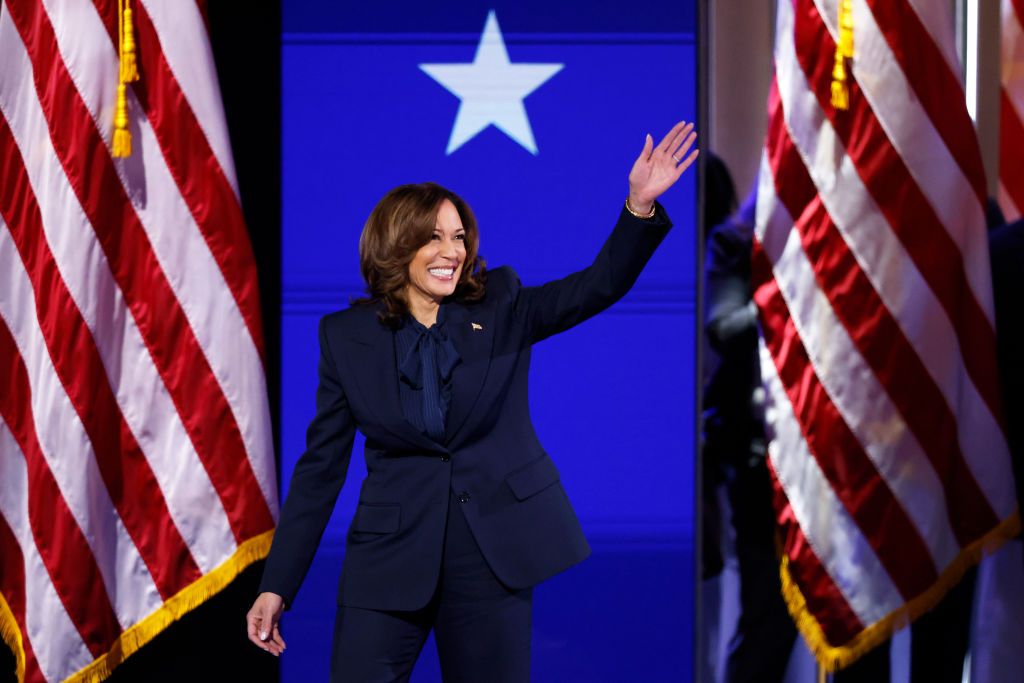
CHICAGO—If ever we needed more proof that Twitter X is not real life, take all the buzz yesterday about a “surprise” Democratic National Convention guest. Convention organizers on Wednesday had already successfully snuck Oprah Winfrey, disguised in a hat and sunglasses, into the United Center in Chicago to make an unannounced appearance in prime time, so the rumor of an even bigger surprise looming didn’t seem terribly far-fetched.
But on Thursday, names of another potential surprise speaker started flying: Republican Sen. Mitt Romney of Utah, former President George W. Bush, former Vice President Mike Pence, basketball legend Michael Jordan, Taylor Swift, and, of course, Beyoncé—whose song “Freedom” has been an unofficial Harris campaign anthem.
Needless to say, there was no surprise performance from Queen Bey.
But the convention itself was a public reckoning with Democrats’ past and future. The week firmly closed the book on the Joe Biden political era in favor of a new Harris epoch. Democrats spent the week trying to frame Harris not as the inheritor of the troubled Biden legacy—or even that of Hillary Clinton, the Democrats’ previous female nominee. Rather, the party looked back to former President Barack Obama’s 2008 “hope and change” campaign in an effort to cast Harris as a challenger in the race, rather than the incumbent vice president.
The result was a week heavy on “good vibes,” if light on policy—reflecting a party that, for the first time in this election cycle, seems to think it could actually win.
Harris’ tight, 40-minute address Thursday night—delivered to a crowd supplied with American flags and “Kamala” signs—drew heavily on American idealism. “Fellow Americans, I love our country with all my heart,” Harris said at one point. She spoke of the “promise of America” and the “incredible journey that is America.”
That patriotic theme capped off a Democratic National Convention that leaned into positive descriptions of America and demonstrations thereof. Each night, delegates on the floor of the United Center arena waved signs that said “USA” and could often be heard chanting the same three letters. Either buoyed by their newfound optimism in their electoral chances or reacting to former President Donald Trump’s reflexively grim diagnosis of America, Democrats seemed to want to celebrate their love of country.
“Our opponents in this race are out there, every day, denigrating America, talking about how terrible everything is,” Harris said. “Well, my mother had another lesson she used to teach. Never let anyone tell you who you are. You show them who you are.”
As Harris spoke, Trump “truthed.” He suggested Harris “caused” the October 7 attack by Hamas on Israel, said her speech was nothing but “complaining,” and said she would usher in “Nuclear World War III.” “SHE HAS LED US INTO FAILING NATION STATUS!” he posted at 11:12 p.m. ET.
Though the event was originally intended to be a party for Biden as he prepared to take on Trump a second time, the sitting president who decided to drop out of the race a month ago this week felt far removed from the proceedings. Biden spoke on Monday night, appearing well after prime time on the East Coast, as far away as he could be from Harris’ nomination acceptance speech on the last night of the convention. By Thursday, his appearance—despite the sporadic chants of “Thank you, Joe,” when he was occasionally mentioned—seemed like a distant memory.
And in contrast to the energy, or lack thereof, around Biden’s campaign, the DNC was undeniably electric, with musical performances by Jason Isbell, John Legend, Stevie Wonder, and P!nk—though not, obviously, Beyoncé. Even the roll call—usually a rather dull proceeding when each state’s delegation formally casts its votes for the nominee—turned into a dance party with a surprise appearance by rapper Lil Jon. Throughout the week, speakers emphasized a key Harris campaign theme: joy. “Take it from a man who once had the honor to be called in this convention the man from Hope,” said former President Bill Clinton, who spoke Wednesday, and is originally from Hope, Arkansas. “We need Kamala Harris, the president of joy, to lead us.”
Even attacks on former Trump and his running mate Sen. J.D. Vance of Ohio, were mostly couched as humorous digs. “I want to know,” said former first lady Michelle Obama. “Who’s going to tell [Trump] that the job he’s currently seeking might just be one of those ‘black jobs’?” The reference to Trump’s comment about “black jobs” during his June 27 debate with Biden brought the house down at the United Center. Barack Obama seemed to make a lewd joke at Trump’s expense. Oprah took a stab at Vance’s “childless cat lady” gaffe.
Rarely did the convention’s speakers lean into the “saving democracy” language that had animated the Biden campaign—and when speakers did make that argument against Trump, they were mostly current or former Republicans delivering a message to independents and moderates. “I realized Donald Trump was a direct threat to democracy,” said former Georgia Lt. Gov. Geoff Duncan, describing Trump’s efforts to overturn the results of the 2020 election in Georgia. “His actions disqualified him from ever, ever, ever stepping foot in the Oval Office again.”
But Democrats’ excitement was at times palpably tempered by the lessons of previous losses—and perhaps for good reason, since the race is currently in a statistical tie. Speaker after speaker warned—slightly condescendingly, on occasion—against underestimating support for Trump and urged Democrats to “do something,” as Michelle Obama put it. “It’s the fourth quarter. We’re down a field goal. But we’re on offense and we’ve got the ball,” said former high school football defensive coordinator and vice presidential nominee Gov. Tim Walz at the end of his speech on Wednesday night. “We’re driving down the field. And boy, do we have the right team. … Our job for everyone watching, is to get in the trenches and do the blocking and tackling. One inch at a time. One yard at a time. One phone call at a time. One door knock at a time. One $5 donation at a time.”
For all its musical guests, chanting football players, and world-famous TV hosts, the week was remarkably short on specific policies. While speakers made passing references to the “freedoms” they meant to secure, including expanding access to abortion, protecting Medicare and Medicaid, and instituting stricter gun control laws in the name of “freedom from gun violence,” the convention was fairly substance-free. It’s part of a trend for the Harris campaign, which has so far only described a handful of economic policies that actual economists have widely panned as inflationary and counterproductive.
The DNC did, however, effectively stiff-arm the “Uncommitted” movement—delegates who represented voters who cast protest ballots to punish Biden, and now Harris, for their support of Israel. Anti-Israel protests that had been billed by the organizers as rivaling the 1968 Democratic National Convention in Chicago largely failed to materialize. The convention’s organizers also refused to give a speaking slot to someone selected by the Uncommitted delegates.
On Wednesday, in one of the most striking moments of the week, the parents of an American hostage being held by Hamas, Hersh Goldberg-Polin—whose arm was blown off when he was kidnapped by Hamas while attending the Nova music festival in southern Israel on October 7—took the stage to a sustained standing ovation. As attendees wiped tears from their eyes, the applause gave way to chants of “Bring them home!” Rachel Goldberg, Hersh’s mother, collapsed over the podium in tears as the chants continued. “This is a political convention, but needing our only son and all of the cherished hostages home is not a political issue,” said Jon Polin, speaking after his wife. Both of them had the number “320” taped to their shirts—marking the number of days their son has spent in captivity.
Harris, for her part, fairly forcefully signaled her support for Israel while acknowledging the human tragedy of civilian deaths in Gaza in her speech Thursday. “I will always stand up for Israel’s right to defend itself, and I will always ensure Israel has the ability to defend itself,” she said. “Because the people of Israel must never again face the horror that the terrorist organization Hamas caused on October 7.” She added that “the scale of suffering” in the Gaza Strip “is heartbreaking.”
She closed her address by returning to one of those themes that typified the convention: patriotism. “We are the heirs to the greatest democracy in the history of the world,” she said. “And on behalf of our children and grandchildren, and all those who sacrificed so dearly for our freedom and liberty, we must be worthy of this moment. It is now our turn to do what generations before us have done. Guided by optimism and faith, to fight for this country we love. To fight for the ideals we cherish. And to uphold the awesome responsibility that comes with the greatest privilege on Earth. The privilege and pride of being an American.”
Worth Your Time
- How do we know price controls don’t work? History and economics, answered Leonidas Zelmanovitz. Writing for Law & Liberty, he highlighted the fallout from then-Brazilian President Jose Sarney’s experiment with price controls in the late 1980s. “In a matter of months, the obvious consequences of Sarney’s price control policy started to manifest themselves,” he wrote. “When milk became unprofitable at the controlled price, producers started to sell their cows to slaughterhouses, and milk production plunged. Once the dairy farms were emptied of cattle, the price of meat would not allow the slaughterhouses to pay the cattle growers for their animals, so they stopped selling them and meat production also plunged.” The scheme’s failure should come as no surprise, because market prices are a signal of market preferences: “Prices help each individual determine subjective priorities, such as whether he or she prefers to pay a dollar fifty for the chocolate croissant instead of a dollar twenty for the plain one. In the same way, prices help economic agents coordinate their intersubjective preferences. … Prices allow market participants to generate information about the most rational way for them to cooperate.”
Presented Without Comment
Former President Donald Trump on Twitter Thursday night, three weeks after picking a fight with Georgia Gov. Brian Kemp and his wife, calling Kemp a “bad guy” and “very average governor”:
Thank you to @BrianKempGA for all of your help and support in Georgia, where a win is so important to the success of our Party and, most importantly, our Country.
I look forward to working with you, your team, and all of my friends in Georgia to help MAKE AMERICA GREAT AGAIN!
Also Presented Without Comment
New York Times: Second-Largest Diamond Ever Found Is Discovered in Botswana
In the Zeitgeist
It’s standard to fill the beginning of a movie trailer with praise from impressed reviewers. But the trailer for Francis Ford Coppola’s Megalopolis, a sci-fi drama, was filled with a stream of biting, negative reviews attributed to real critics for the famed director’s previous works—oh, and they were apparently all fake. *waves hands* Art, we suppose.
Toeing the Company Line
- In the newsletters: The Dispatch Politics team reported on the all-American vibes from the third day of the Democratic National Convention, Will explored the failure of a once-promising NASA space exploration program, and Nick wondered (🔒) whether Donald Trump truly would be better off focusing his campaign on policy rather than personal insults.
- On the podcasts: Sarah, Jonah, Mike, and Drucker were breaking down the Democratic National Convention into the wee hours of the morning. Everyone can catch the first 20 minutes of the discussion on The Dispatch Podcast, and Dispatch members can tune in for the full thing on The Skiff or Dispatch Live.
- On the site: Luis dives into Tim Walz’s selective approach to neighborliness and Kevin writes about what it would mean for Kamala Harris to be the first female president.
Let Us Know
What did you make of the DNC? Did it change your opinion of either Harris or Walz? How would you compare it to the RNC?





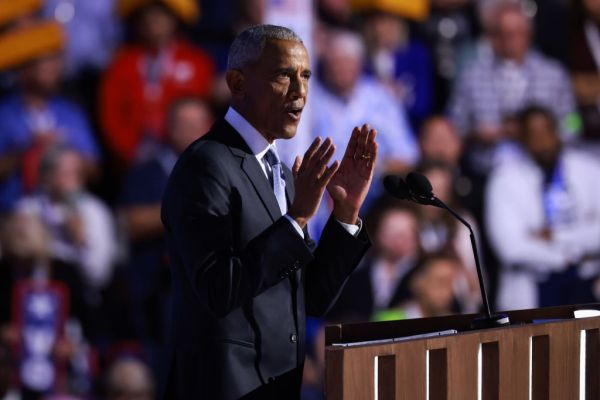
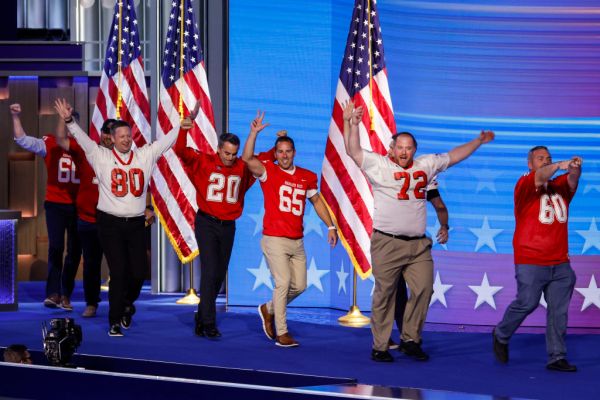
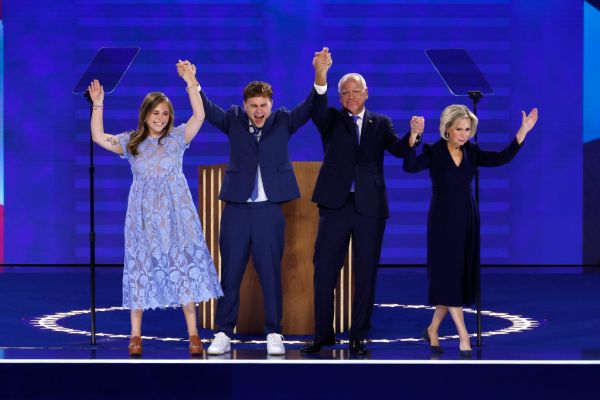

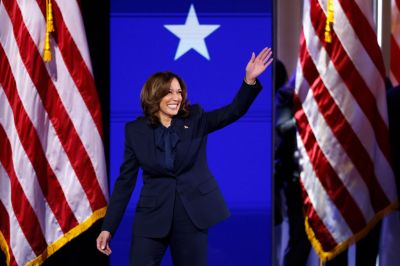
Please note that we at The Dispatch hold ourselves, our work, and our commenters to a higher standard than other places on the internet. We welcome comments that foster genuine debate or discussion—including comments critical of us or our work—but responses that include ad hominem attacks on fellow Dispatch members or are intended to stoke fear and anger may be moderated.
With your membership, you only have the ability to comment on The Morning Dispatch articles. Consider upgrading to join the conversation everywhere.